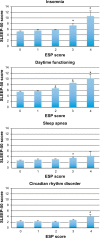Sleep, eating disorder symptoms, and daytime functioning
- PMID: 26848280
- PMCID: PMC4723032
- DOI: 10.2147/NSS.S97574
Sleep, eating disorder symptoms, and daytime functioning
Abstract
Objective: To investigate the relationship between eating disorders, body mass index (BMI), sleep disorders, and daytime functioning.
Design: Survey.
Setting: The Netherlands.
Participants: N=574 Dutch young adults (18-35 years old).
Measurements: Participants completed a survey on eating and sleep habits including the Eating Disorder Screen for Primary care (ESP) and SLEEP-50 questionnaire subscales for sleep apnea, insomnia, circadian rhythm disorder (CRD), and daytime functioning. SLEEP-50 outcomes of participants who screened negative (≤2) and positive (>2) on the ESP were compared. In addition, SLEEP-50 scores of groups of participants with different ESP scores (0-4) and different BMI groups (ie, underweight, healthy weight, overweight, and obese) were compared using nonparametric statistics.
Results: Almost 12% (n=67) of participants screened positive for having an eating disorder. Relative to participants without eating disorders, participants who screened positive for eating disorders reported significantly higher scores on sleep apnea (3.7 versus 2.9, P=0.012), insomnia (7.7 versus 5.5, P<0.0001), CRD (2.9 versus 2.3, P=0.011), and impairment of daytime functioning (8.8 versus 5.8, P=0.0001). ESP scores were associated with insomnia (r=0.117, P=0.005), sleep apnea (r=0.118, P=0.004), sleep quality (r=-0.104, P=0.012), and daytime functioning (r=0.225, P<0.0001), but not with CRD (r=0.066, P=0.112). BMI correlated significantly with ESP scores (r=0.172, P<0.0001) and scores on sleep apnea (r=0.171, P<0.0001). When controlling for BMI, the partial correlation between ESP and sleep apnea remained significant (r=0.10, P=0.015).
Conclusion: Participants who score positive for eating disorders scored significantly higher on sleep disorder scales, and reported significantly more impairment of daytime functioning.
Keywords: apnea; circadian rhythm disorder; daytime functioning; eating disorders; insomnia; sleep disorders.
Figures

Similar articles
-
The daytime impact of DSM-5 insomnia disorder: comparative analysis of insomnia subtypes from the Great British Sleep Survey.J Clin Psychiatry. 2012 Dec;73(12):e1478-84. doi: 10.4088/JCP.12m07954. J Clin Psychiatry. 2012. PMID: 23290331
-
Perceived Immune Status and Sleep: A Survey among Dutch Students.Sleep Disord. 2015;2015:721607. doi: 10.1155/2015/721607. Epub 2015 Sep 10. Sleep Disord. 2015. PMID: 26448877 Free PMC article.
-
Correlations between night eating, sleep quality, and excessive daytime sleepiness in a severely obese UK population.Sleep Med. 2013 Nov;14(11):1151-6. doi: 10.1016/j.sleep.2013.04.026. Epub 2013 Aug 8. Sleep Med. 2013. PMID: 24047537
-
Nonrestorative sleep in healthy, young adults without insomnia: associations with executive functioning, fatigue, and pre-sleep arousal.Sleep Health. 2018 Jun;4(3):284-291. doi: 10.1016/j.sleh.2018.02.006. Epub 2018 Mar 27. Sleep Health. 2018. PMID: 29776623
-
Sleep disorders: impact on daytime functioning and quality of life.Expert Rev Pharmacoecon Outcomes Res. 2009 Feb;9(1):49-64. doi: 10.1586/14737167.9.1.49. Expert Rev Pharmacoecon Outcomes Res. 2009. PMID: 19371179 Review.
Cited by
-
Are Sleep Parameters and Chronotype Associated with Eating Disorder Risk? A Cross-Sectional Study of University Students in Spain.J Clin Med. 2024 Sep 15;13(18):5482. doi: 10.3390/jcm13185482. J Clin Med. 2024. PMID: 39336969 Free PMC article.
-
Subjective Sleep Quality, Caffeine, and Dieting Behaviors Among University-Attending Young Adults.Nat Sci Sleep. 2023 Sep 22;15:737-747. doi: 10.2147/NSS.S420568. eCollection 2023. Nat Sci Sleep. 2023. PMID: 37766873 Free PMC article.
-
Is poor sleep quality related to disordered eating behavior and mental health among university students?Sleep Biol Rhythms. 2022 Feb 9;20(3):345-352. doi: 10.1007/s41105-022-00374-9. eCollection 2022 Jul. Sleep Biol Rhythms. 2022. PMID: 38469421 Free PMC article.
-
Interplay Between Sociodemographic Variables, Physical Activity, Sleep, Dietary Habits, and Immune Health Status: A Cross-Sectional Study From Saudi Arabia's Western Province.Cureus. 2023 Jan 1;15(1):e33211. doi: 10.7759/cureus.33211. eCollection 2023 Jan. Cureus. 2023. PMID: 36733572 Free PMC article.
-
The Role of Problematic Smartphone Uses and Psychological Distress in the Relationship Between Sleep Quality and Disordered Eating Behaviors Among Chinese College Students.Front Psychiatry. 2021 Dec 13;12:793506. doi: 10.3389/fpsyt.2021.793506. eCollection 2021. Front Psychiatry. 2021. PMID: 34966312 Free PMC article.
References
-
- Verster JC, Pandi-Perumal SR, Streiner DL, editors. Sleep and Quality of Life in Clinical Medicine. Totowa, NJ: Humana Press (Springer); 2008.
-
- Van der Wal JS. Night eating syndrome: a critical review of the literature. Clin Psychol Rev. 2012;32:49–59. - PubMed
-
- Olbrich K, Mühlhans B, Allison KC, et al. Night eating, binge eating and related features in patients with obstructive sleep apnea syndrome. Eur Eat Disord Rev. 2009;17:120–127. - PubMed
LinkOut - more resources
Full Text Sources
Other Literature Sources

